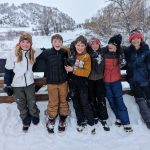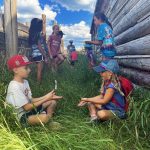PRIDE WEEK
Mountain Connection, March 14, 2022
This week SMS is celebrating PRIDE Week. We’re taking time throughout the week to educate and be present in our community. Thanks to QSA for putting together this programming and planning a week of allyship and celebration. The following is what our students and faculty discussed today in advisory.
How to be a Good Ally [Source: University of College London.edu]
- Be open to learn, listen and educate yourself
Part of being supportive to your LGBTQ+ friends and loved ones means developing a true understanding of how the world views and treats them. It sounds obvious, but to learn, you need to be willing and open to truly listen. Listen to your friend’s personal stories and ask questions respectfully. Take it upon yourself to learn about LGBTQ+ history, terminology, and the struggles that the community still faces today. Sure, your friend may be happy to answer your questions but they are not a walking LGBTQ+ encyclopedia! The Internet is a wonderful resource in this instance.
- Don’t assume
Don’t assume that all of your friends, co-workers, and even housemates are straight. Don’t assume someone’s gender or pronouns. LGBTQ+ people don’t look a particular way and someone’s current or previous partner(s) doesn’t define their sexuality. Someone close to you could be looking for support – not making assumptions will give them the space they need to be their authentic self and open up to you in their own time.
- Think of ‘ally’ as an action rather than a label
It is easy to call yourself an ally, but the label alone isn’t enough. Oppression doesn’t take breaks. To be an effective ally you need to be willing to be consistent in your support of LGBTQ+ rights and defend LGBTQ+ people against discrimination. Anti-LGBTQ+ comments and jokes are harmful – let your friends, family and co-workers know that as an ally you find them offensive.
- Know that language matters
We form human connections through language. The majority of us respect when someone changes their nickname – accommodating LGBTQ+ people’s names and pronouns are no different. If you are unsure of someone’s pronoun or label, just ask them respectfully. When meeting new people try integrating inclusive language into your regular conversations by using gender neutral terms such as ‘partner’ and keep an eye on any unintentionally offensive language you may use everyday.
- Know that you will mess up sometimes – breathe, apologize, and ask for guidance
Accidentally assumed someone’s label? Having a conversation about someone who is trans or non-binary, and unintentionally used the wrong pronoun? It happens – don’t panic, apologize, and correct yourself.
Discussion question: how can you use more inclusive language in your day to day conversations?
LGBTQ+ History [Source: College of Coastal Georgia.edu]
1924: The Society for Human Rights in Chicago becomes the country’s earliest known gay rights organization.
1962: Illinois becomes the first state in the U.S. to decriminalize homosexual acts between consenting adults in private.
1969: The Stonewall riots transform the gay rights movement from one limited to a small number of activists into a widespread protest for equal rights and acceptance. Patrons of a gay bar in New York’s Greenwich Village, the Stonewall Inn, fight back during a police raid on June 27, sparking three days of riots.
1973: The American Psychiatric Association removes homosexuality from its official list of mental disorders.
1973: Harvey Milk runs for city supervisor in San Francisco. He runs on a socially liberal platform and opposes government involvement in personal sexual matters. Milk comes in 10th out of 32 candidates, earning 16,900 votes, winning the Castro District and other liberal neighborhoods. He receives a lot of media attention for his passionate speeches, brave political stance, and media skills.
Watch: Harvey Milk trailer
1982: Wisconsin becomes the first state to outlaw discrimination on the basis of sexual orientation.
1993: The “Don’t Ask, Don’t Tell” policy is instituted for the U.S. military. This policy permitted queer identities to serve in the military, but the act prohibited any homosexual male, lesbian, or bisexual from disclosing their sexual orientation or from speaking about any same-sex relationships, including marriages or other familial attributes.
2003: The U.S. Supreme Court rules in Lawrence v. Texas to decriminalization sexual intimacy between same-sex couples. Justice Anthony Kennedy wrote, “Liberty presumes an autonomy of self that includes freedom of thought, belief, expression, and certain intimate conduct.”
2007: In November, the House of Representatives approves a bill ensuring equal rights in the workplace for gay men, lesbians, and bisexuals.
2010: December 18, the U.S. Senate votes 65 to 31 in favor of repealing Don’t Ask, Don’t Tell.
2015: On June 26, 2015, the U.S. Supreme Court struck down all state bans on same-sex marriage, legalized it in all fifty states, and required states to honor out-of-state same-sex marriage licenses in the case Obergefell v. Hodges.
2022: So far, in the short months of 2022 there have been over 150+ bills introduced to state legislatures that would negatively impact LGBTQIA + youth.
Discussion question: Do any of these dates surprise you? What stands out the most?
Identity & Sexuality Terminology [Source: Human Rights Campaign.org]
Ally | A term used to describe someone who is actively supportive of LGBTQ+ people. It encompasses straight and cisgender allies, as well as those within the LGBTQ+ community who support each other (e.g., a lesbian who is an ally to the bisexual community).
Asexual | Often called “ace” for short, asexual refers to a complete or partial lack of sexual attraction or lack of interest in sexual activity with others. Asexuality exists on a spectrum, and asexual people may experience no, little or conditional sexual attraction.
Cisgender | A term used to describe a person whose gender identity aligns with those typically associated with the sex assigned to them at birth.
Intersex | The intersex definition is a person is born with a combination of male and female biological traits. There are several different intersex conditions and it is estimated that 1.7% of the population is intersex.
Non-binary | An adjective describing a person who does not identify exclusively as a man or a woman. Non-binary people may identify as being both a man and a woman, somewhere in between, or as falling completely outside these categories.
Queer | A term people often use to express a spectrum of identities and orientations that are counter to the mainstream. Queer is often used as a catch-all to include many people, including those who do not identify as exclusively straight and/or folks who have non-binary or gender-expansive identities. This term was previously used as a slur, but has been reclaimed by many parts of the LGBTQ+ movement.
Discussion question: Do you have questions about any identities or terminology you’ve encountered?



